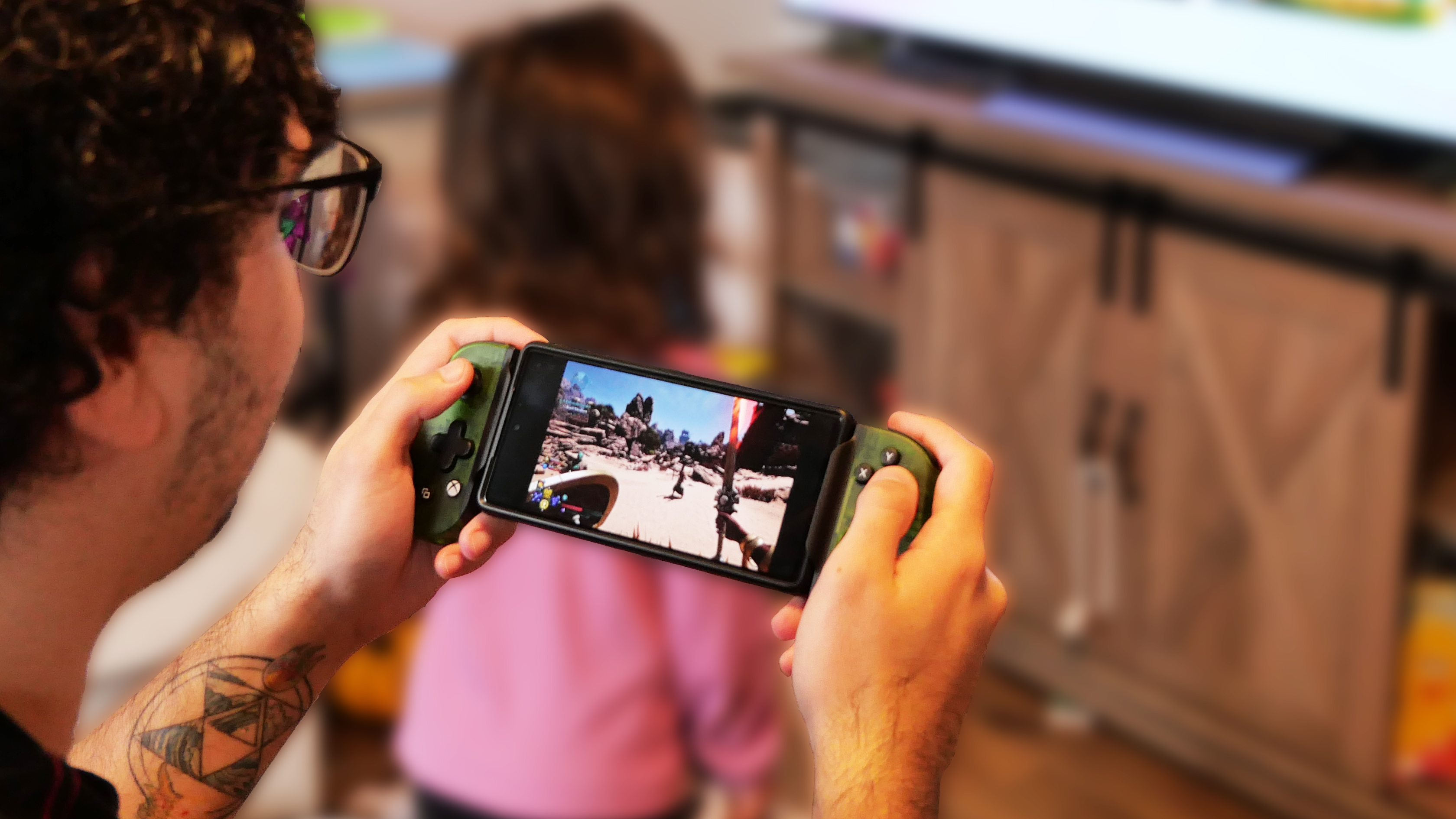Laptop Mag Verdict
The Aorus X9 fires on all performance cylinders and has a solid keyboard, but very hot temperatures and a disappointing display hold it back.
Pros
- +
Incredible productivity performance
- +
Customizable RGB lighting
- +
Mechanical keyboard
- +
Strong gaming performance
Cons
- -
Runs very hot
- -
Display is dim
Why you can trust Laptop Mag
Lots of gaming-notebook manufacturers say their laptops are designed to "conquer" or "shred." But the $3,899 Aorus X9 showed us its power rather than telling, with an Intel Core i9 processor and an Nvidia GeForce GTX 1080 to plow through any productivity or gaming task you throw at it. It also comes with an array of customizable lights, and I'm a fan of any laptop that includes a mechanical keyboard. But the 144-Hz, 1080p display is dimmer than I would like, and this thing runs hot and loud consistently. It has enough power not just for a gamer but also a streamer and podcaster, if you can deal with the fussy annoyances.
Design
While I know in my head that the Aorus X9 comes off of a factory assembly line, in my heart, it's what happens when an alien spaceship makes love to a race car and they have a baby underneath a phoenix rising from the ashes. The X9 takes the stereotypical gaming design to its logical extreme, with a jet-black aluminum lid that looks like the hood of a roadster with an LED-backed falcon logo.
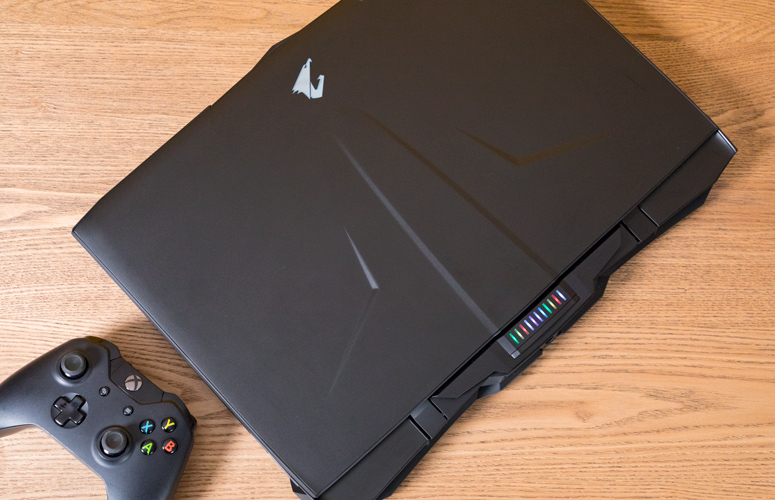
Inside, the 17.3-inch display is surrounded by a tremendous bezel. Under the display is a series of 11 RGB lights (just for show), massive speakers placed right above the keyboard (which is also backlit) and a touchpad with the Aorus falcon on it in gold.
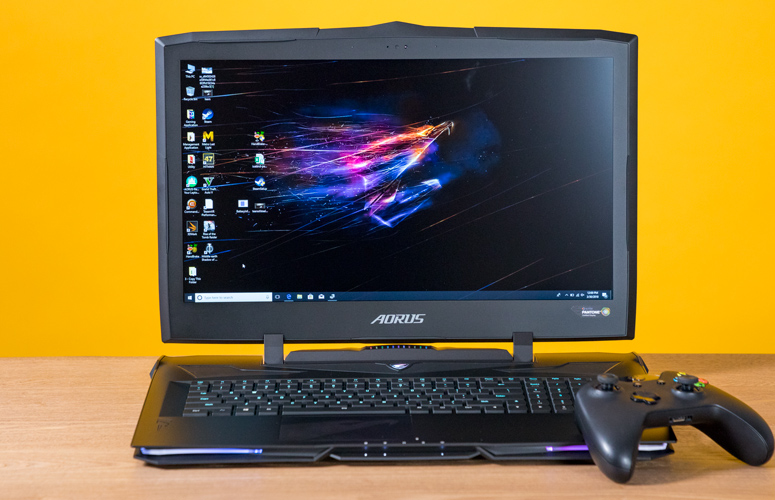
Need some more pops of color? On the very front of the PC, below the palm rest, are two more RGB lights that can be customized. On the back? Another two.
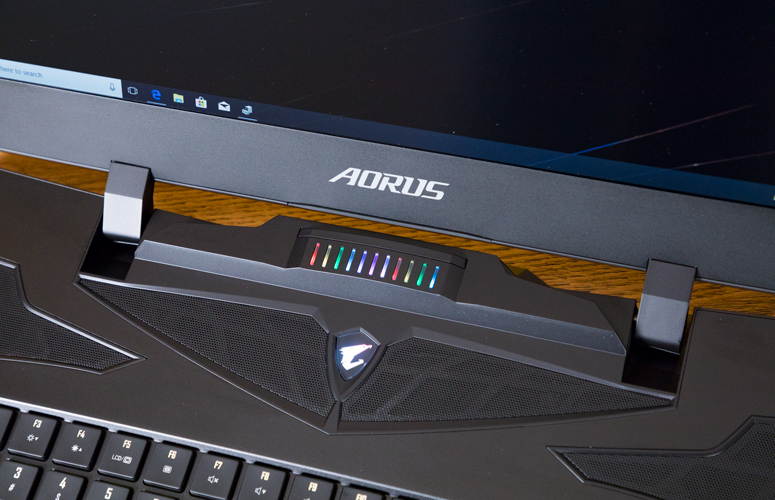
The sides of the laptops have every port you could need; Ethernet, USB 3.0 and an SD card reader, and headphone and microphone jacks are on the left side. On the right are a pair of USB 3.0 ports, Thunderbolt 3, USB Type-C, a mini DisplayPort and an HDMI-out port.
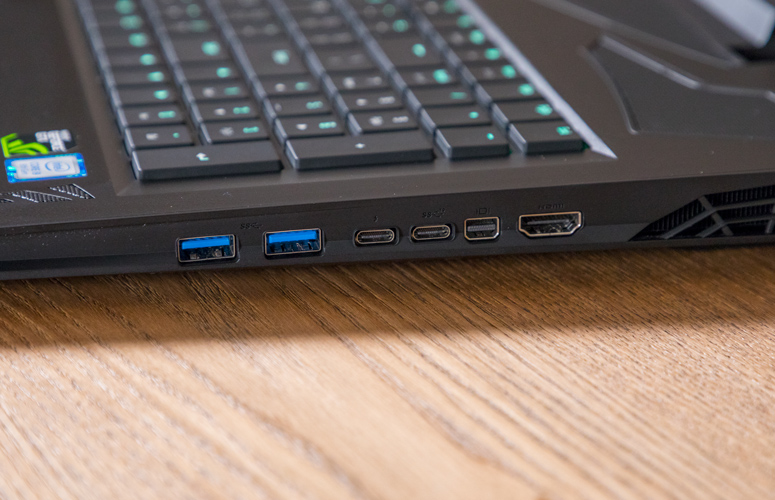
At 8.1 pounds and 16.9 x 12.4 x 1.2 inches, the X9 is fairly light and roughly the same size as other 17-inch gaming notebooks. The Alienware 17 R4 is heavier, at 9.6 pounds, and has a 16.7 x 13.1 x 1.2-inch footprint, and the Origin PC Eon17-X is 8.6 pounds and 16.4 x 11.6 x 1.6 inches. The Razer Blade Pro is the lightest and slimmest of the bunch, at 7.7 pounds and 16.7 x 11 x 0.88 inches.
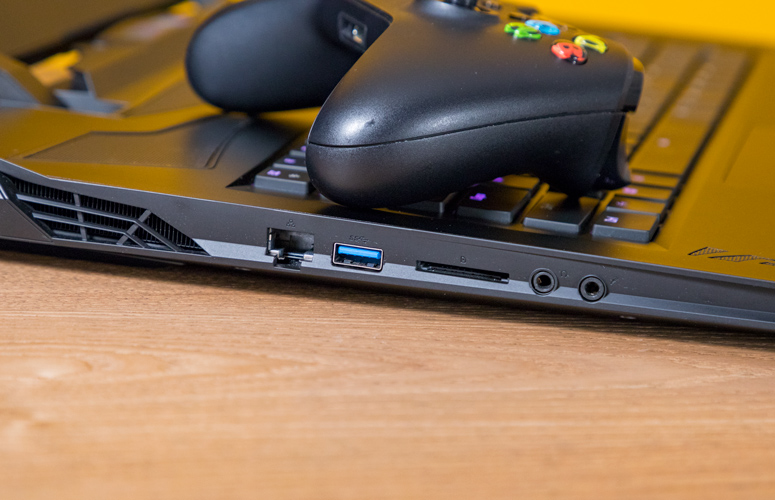
Display
Aorus put a massive, 17.3-inch, 144-Hz, 1080p display with G-Sync on the X9, and the company claims that the panel color-calibrated out of the box. In my experience, it was perfectly usable but not as bright or as vivid as the competition.
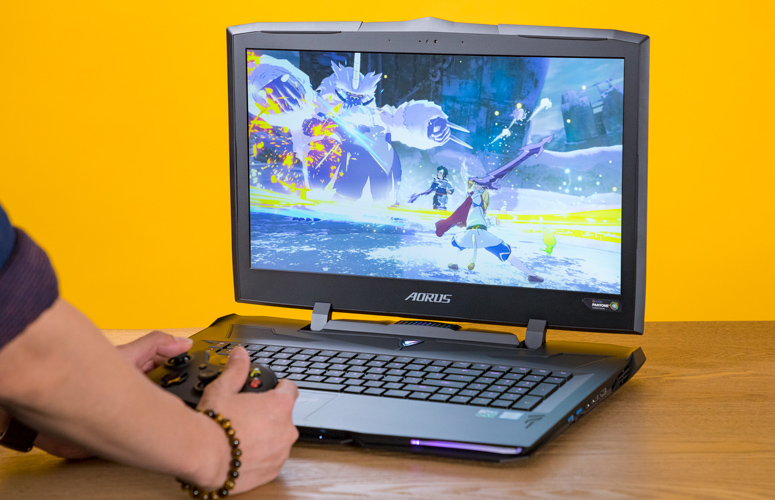
When I watched a trailer for Ant-Man and the Wasp, dark scenes in a lab were a bit too dark, hiding detail in the background. Ant-Man's red accents and a purple hot-rod car popped against gray and silver backgrounds, but not in the way I've seen on other screens.
When I played Middle-earth: Shadow of Mordor, the dim screen made it hard to see areas with dark trees and shadowy fortresses, but brighter areas that were closer to the action were fine.
When I watched a trailer for Ant-Man and the Wasp, dark scenes in a lab were a bit too dark, hiding detail in the background.
The X9's screen measured 243 nits on our light meter, falling not only below the premium-gaming average (285 nits) but also the Alienware 17 R4 (340 nits), the Razer Blade Pro (320 nits) and the Origin PC Eon17-X (252 nits).
Aorus' panel covers 122 percent of the sRGB color gamut. While that's better than the Alienware (113 percent) and the Eon (104 percent), the average is 138 percent and the Blade Pro measured an astounding 178 percent.
Keyboard and Touchpad
The Aorus X9 has a mechanical keyboard that's better than any membrane keyboard you'll ever find on a notebook. We measured 2.3 millimeters of key travel with 72 grams of force required to actuate the keys. On the 10fastfingers.com typing test, I reached a standard 114 words per minute with my usual 2-percent error rate.
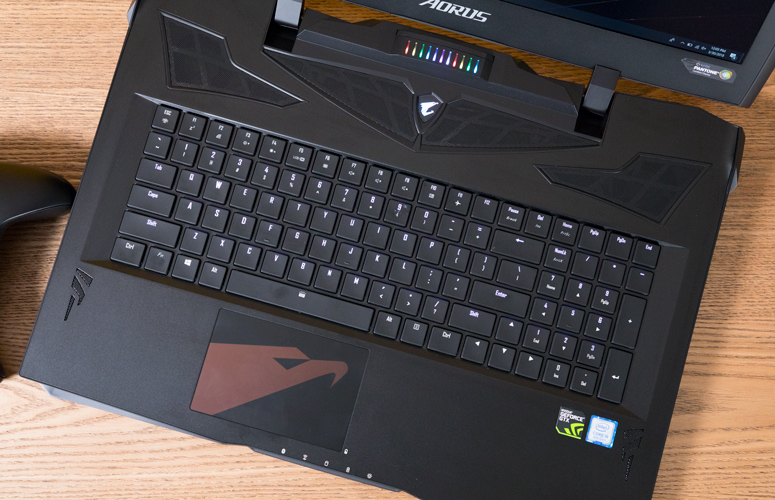
Like all the other lights on the computer, the keyboard is RGB-backlit and can be customized on a per-key basis with the Aorus Fusion app.
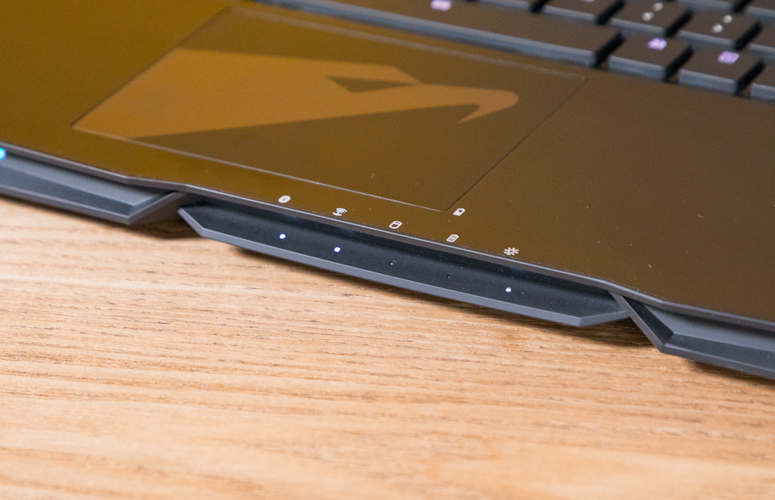
The 4.1 x 2.7-inch touchpad has a golden Aorus logo on it. It's not a Precision Touchpad, so while you can pinch to zoom and two-finger scroll, some Windows 10 gestures, like tapping with four fingers to open the Action Center, don't work.
Audio
The speakers on the Aorus X9 aren't just for show. They produce detailed sound, although I wish they were a little louder. When I listened the White Rabbits' "Percussion Gun," the drums sat right above the rest of the mix, but the guitars, keys and vocals were still clear.
MORE: The Best Gaming Laptops
I had a similar experience while playing Middle-earth: Shadow of Mordor. Small sound effects, like the unsheathing of a blade and leaves rustling, were crisp. Character voices were loud enough, but background music didn't make an impression.
You can switch among four presets in the Aorus Fusion app for different types of games, but all except the default RPG setting lost some detail.
Gaming, Graphics and VR
Crank up the settings on your games; the X9 can handle it. Its Nvidia GeForce GTX 1080 GPU with 8GB of VRAM, paired with an Intel Core i9 CPU, can handle anything you throw at it. When I played Middle-earth: Shadow of War on Ultra settings at 1080p, the game ran between 83 and 93 fps as I attempted to stealthily take out orcs in their forest fortress (and when I was inevitably caught).
On the Rise of the Tomb Raider benchmark (Very High, 1080p), the game ran at a smooth 73 fps, tying the Razer Blade Pro and easily surpassing the premium-gaming average (48 fps), the Alienware 17 R4 (62 fps) and the Origin PC Eon17-X (69 fps). All of the competitors have the same GPU.
Crank up the settings on your games; the X9's Nvidia GeForce GTX 1080 GPU and Intel Core i9 CPU can handle it.
When it came to the taxing Metro: Last Light benchmark (High, 1080), the X9 rendered the title at 85 fps, coming out on top of the average (61 fps), the Eon (82 fps), the Alienware (80 fps), and the Blade Pro (71 fps).
On Grand Theft Auto V (1080p, Very High), the laptop played the game at 86 fps, surpassing the average (68 fps), the Alienware (82 fps), the Blade Pro (81 fps) and the Eon (55 fps).
Have a VR headset? No problem. The X9 scored an 11 -- the top mark possible -- on the StreamVR performance test.
Performance
The Aorus X9 is the first laptop we've tested with Intel's 8th Gen "Coffee Lake" Core i9-8950HK CPU. The Core i9 has six cores, and it showed in our performance benchmarks. The machine also comes with 32GB of RAM; a 1TB, 7,200-rpm HDD; and a 1TB, PCIe SSD.
I opened 30 tabs in Chrome, including one streaming a 1080p clip from The Daily Show with Trevor Noah, as a matter of course. But no surprise: The Aorus had no issues whatsoever. This is the type of power you need if you want to not only play games but also stream them and produce other media (maybe you have a gaming podcast?).
MORE: Our Favorite Tablets for Work and Play
On the Geekbench 4 overall performance test, the X9 notched a jaw-dropping score of 25,915 -- the highest we've ever seen on a laptop. The average premium-gaming score is 15,799, and the Alienware 17 R4 (14,154, Core i7-7820HK), the Origin PC Eon17-X (21,273, Core i7-8700K) and the Razer Blade Pro (15,404, Core i7-7820HK) all scored lower than the X9.
The X9 took 12 seconds to copy 4.97GB worth of files, for a rate of 424 MBps. That's faster than the Alienware (282 MBps) and the Blade Pro (339 MBps) but slower than the Eon (566 MBps) and the premium-gaming average (626.9 Mbps).
On our Excel macro test, in which computers pair 65,000 names and addresses, the X9 took 31 seconds, shaving nearly 20 seconds off the 50-second average and beating every other laptop.
It's also the fastest computer we've seen so far on our HandBrake video editing test, which has computers transcode a 4K video to 1080p. The average premium gaming notebook takes 14 minutes and 10 seconds, and the X9 did it in just 8 minutes and 15 seconds.
Battery Life
You should just keep the Aorus plugged in all the time. Besides being a 17-incher, which means it's not all that portable, it lasted only 2 hours and 20 minutes on the Laptop Mag Battery Test.
MORE: Laptops with the Longest Battery Life
That benchmark browses the web, plays videos and runs a graphics test continuously over Wi-Fi at 150 nits of brightness. While that's longer than the Origin PC Eon17-X (1:52), it's less than the premium-gaming-laptop average (3:30).
Heat
During nongaming tasks, the Aorus X9 stays cool. After streaming 15 minutes of HD video from YouTube, it measured 85 degrees Fahrenheit on the touchpad, 88 degrees between the G and H keys, and 95 degrees on the underside. On the downside, the fans sounded as if they were running nonstop even when the computer was idling, making an annoying whining sound.
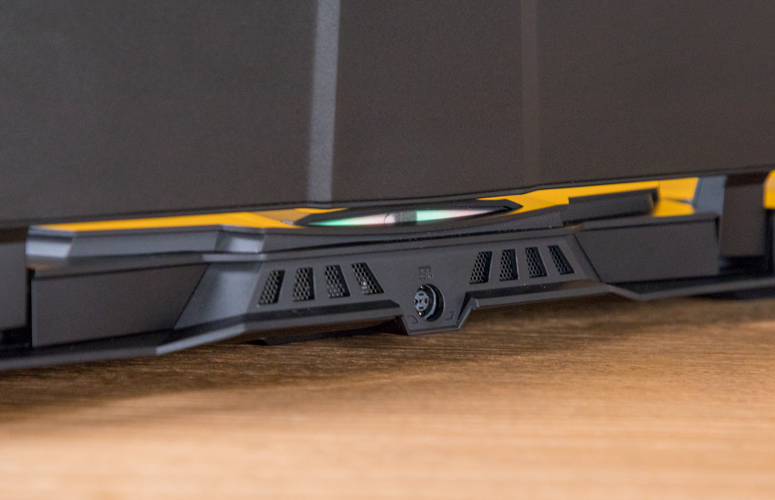
For gaming, though, the temperatures really started to spike. While the keyboard and touchpad kept the same temperatures, the bottom of the laptop ran at a very hot 131 degrees, and the fans were running so loud that I needed to keep the game on maximum volume without a headset.
Webcam
The 720p webcam on the X9 isn't Twitch-quality, but it's good enough for calls with family or friends. In a photo I snapped at my desk, it caught the red of my shirt accurately, as well as individual hairs on my head, even though challenging bright light was coming in from windows near me. Lights on the ceiling weren't blown out, which occurs on many other webcams.
Software and Warranty
Aorus packed the X9 with its own software and some from partners. The best stuff is in the Gaming Application folder: Aorus Fusion, which lets you control the laptop's many RGB lights, set keyboard macros, change audio settings and create profiles for specific games. That's separate from Aorus Command & Control, an app that allows for easy overclocking, as well as fan control and a Do Not Disturb Mode to keep Windows updates from interrupting gaming.
Additionally, XSplit Broadcaster and Gamecaster are on board for streaming video, and the TriDef SmartCam is a rudimentary way to get a green-screen effect.
The Aorus X9 is what happens when an alien spaceship makes love to a race car and they have a baby underneath a phoenix rising from the ashes.
In the Management Application folder on the desktop are apps to update drivers, use Killer Control Center to decide which apps get streaming priority, and a system backup tool.
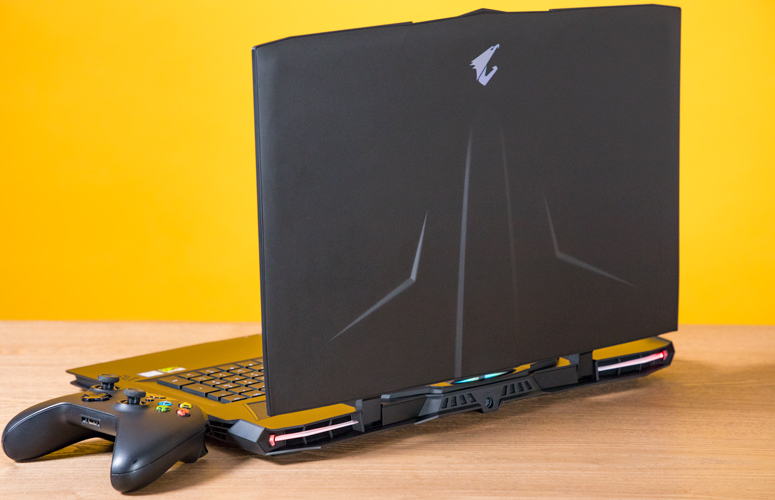
Additionally, Aorus has a shortcut on the desktop to register your laptop and get a tree planted in your honor with the United Nations Environment Programme. This is in line with Aorus' other environmental initiatives, like giving you a completely recyclable box.
Of course, the X9 also includes the bloatware that comes with any Windows 10 machine, including Candy Crush Soda Saga, Disney Magic Kingdoms, Bubble Witch 3 Saga and March of Empires: War of Lords.
Aorus offers a two-year warranty on the X9. See how it performed on our Best and Worst Gaming Brands rankings.
How Much Does the Aorus X9 Cost?
The Aorus X9 has Intel's 8th Gen "Coffee Lake" Core i9-8950HK CPU; 32GB of RAM; an Nvidia GeForce GTX 1080; a 1TB, 7,200-rpm HDD; and a 1TB, PCIe SSD. It also has a 17.3-inch, 1080p display with a 144-Hz refresh rate and Nvidia G-Sync to prevent screen tearing. This is the only configuration as of right now, and it costs $3,899.
Bottom Line
From a productivity standpoint, the Aorus X9 is easily one of the most powerful laptops we've ever seen, thanks to Intel's Core i9 CPU. Pair that with a GTX 1080, and you have a machine that's capable of high-performance graphics for gaming, making the X9 a machine for gamers who need the power to fit a lifestyle of streaming, editing video and recording podcasts.
But the Aorus X9 runs hot, and while you probably won't actually keep a 17-inch notebook on your lap, the constant fan noise, even while it idles, is an annoyance. Additionally, while a 144-Hz screen makes for smooth gaming, the one on the X9 is quite dim.
If you don't need that kind of productivity performance, that opens other options for you. The Razer Blade Pro, which starts at $2,000 but is closer to $4,000 when configured similarly to the Aorus, is far slimmer and more attractive. For the most customization options, check out the Alienware 17 R4.
But to get the latest and greatest with the most powerful processor around, we can see many shoppers splurging for the X9. Just beware the heat.
Credit: Shaun Lucas/Laptop Mag
Aorus X9 (2018) Specs
| Bluetooth | Bluetooth 4.1+LE |
| Brand | Aorus |
| CPU | 2.9 GHz Intel Core i9-8950HK |
| Card Slots | SD memory reader |
| Company Website | https://www.aorus.com/ |
| Display Size | 17.3 |
| Graphics Card | Nvidia GeForce GTX 1080 (8GB) |
| Hard Drive Size | 1 TB |
| Hard Drive Speed | 7,200rpm |
| Hard Drive Type | HDD |
| Highest Available Resolution | 1920 x 1080 |
| Native Resolution | 1920x1080 |
| Operating System | Windows 10 Home |
| Ports (excluding USB) | Microphone, Mini DisplayPort, USB 3.0, USB Type-C, Ethernet, HDMI, Headphone |
| RAM | 32GB |
| Secondary Hard Drive Size | 1TB |
| Secondary Hard Drive Type | PCIe m.2 SSD |
| Size | 16.9 x 12.4 x 1.2 inches |
| Touchpad Size | 4.1 x 2.7 inches |
| USB Ports | 4 |
| Video Memory | 8GB |
| Warranty/Support | 2-year warranty |
| Weight | 8.1 pounds |
| Wi-Fi Model | Killer Wireless 1535 n/a/ac |
